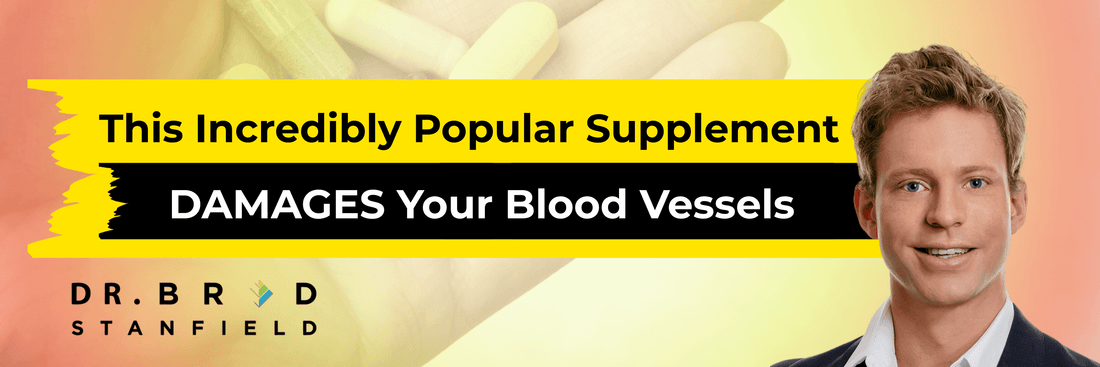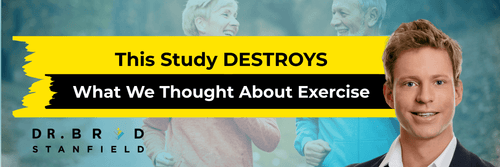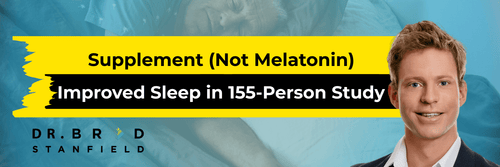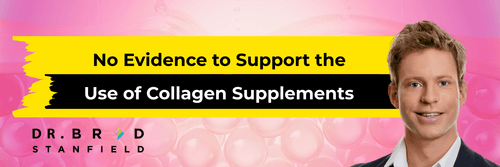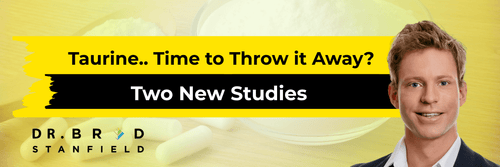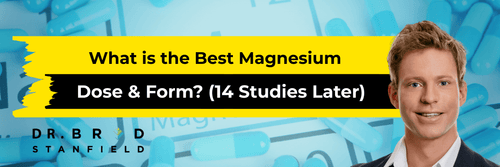It’s absolutely wild to me how many of my patients at the clinic, when I ask them what supplements they are taking, mention one that is actively damaging their blood vessels.
And it’s not just this one. There are four other incredibly popular supplements that the human research shows do more harm than good. I advise my patients to stop taking them immediately.
Table of Contents
Calcium
The first supplement I’m talking about is one of the most abundant minerals in the human body. It’s required for our muscles, including the heart, to function properly. It’s vital for the signals that travel through our nerves. And we can’t have healthy bones without it.

I am of course talking about calcium, and that’s just one of five popular supplements that I warn my patients about.
And if you’re like most of my patients, you’ve probably never heard of the potential dangers of calcium supplements.
Let me explain this. We’ve understood for a long time how important calcium is for healthy bones. And we’ve also known there are groups of people at a higher risk for problems. This is particularly true in older people, since we lose bone mass as we age. As bones become weaker, we’re at a greater risk of fractures and osteoporosis [1].
The risk is especially pronounced for women after menopause. Because of hormonal changes in their bodies, they experience accelerated bone loss at a rate of 3-5% per year for several years [2].
Why does this happen? Our bones are constantly in a process of change. Cellular processes break down old bone and construct new bone. It’s like a road that’s constantly having sections torn up and repaired. As we age, the repairs slow. At some point, the balance tips and we start to lose more than we rebuild. Calcium is a key building material. For several reasons, including decreased absorption, it’s harder for our bodies to get enough as we get older.
So ensuring we have an adequate supply of calcium is smart. And taking calcium supplements seems like the easiest way to do that.
Health is complex, however. What seems logical doesn’t always work the way we’d expect. For one thing, the research on calcium supplements has turned up surprising results. We were expecting a clear benefit in terms of reduced problems like bone fractures. Yet the results are mixed.
One meta-analysis found several studies that reported reduced fracture risks with calcium supplements [3]. And yet many studies had a significant risk of bias. When they isolated just randomized controlled trials with the lowest risk of bias, the story was different. The calcium supplements didn’t seem to help at all [4].
So the benefit is unclear. At the same time, though, we’ve had accumulating evidence of a potential harm.
Several studies have yielded alarming results. One early meta-analysis in 2010 pooled results from trials of calcium supplements. They discovered those taking the supplements had about a 30% increase in the rate of heart attacks [5].
Numbers from a much more recent cohort study were even worse. This one involved people with osteoporosis in South Korea. Researchers noticed those taking calcium supplements without vitamin D skyrocketed their risks of a heart attack by almost 90% [6].
And you might be wondering: Why is vitamin D relevant here? It plays a critical role in regulating calcium in the body. If we don’t have adequate amounts, it seems to make the problems associated with calcium supplements worse.
Let’s look at one more study. This one investigated the association between calcium intake and deaths in a large cohort of women in Sweden. In alignment with what we’ve already seen, they found high calcium intakes were associated with higher death rates from all causes and from heart disease [7].
What’s going on here? Why are calcium supplements linked to heart disease? Scientists suspect it’s because they spike the levels of calcium in our blood. And higher levels of blood calcium can make calcium buildup on the walls of our arteries more likely [8].
In addition to restricting blood flow, this also makes our arteries stiff and unable to expand and contract like they should to adjust to pressure. Elevated calcium can also affect blood clotting. All this boosts the risks for heart problems.
Does this mean we should stay away from calcium? Well, it’s an essential nutrient. So that’s not a great idea. The recommended daily allowance for calcium is over 1,000 mg a day for adults. But how we get our calcium makes all the difference.
We basically have two options. We can get calcium from supplements or we can get it from our diet. (And, of course, we can get it through a combination of the two.) For most people, though, getting calcium from our diet is the way to go.
As we just saw, the current theory is that negative heart impacts from calcium supplements result from the way they spike calcium levels in the blood. Crucially, calcium we get from our diet doesn’t do this [9].
If this is the mechanism driving the problem, here’s what we’d expect. We should see evidence of increased heart disease risk with calcium supplements, but not with calcium from natural sources. So is that what we find?
One large cohort study set out to test the idea. They looked at measures of calcium buildup in the arteries and how these changed over 10 years. Here’s what happened. They found that the highest calcium intakes were associated with a 27% lower risk of developing calcification in the arteries. At the same time, however, the risk was 22% higher for those who used supplements compared to those who didn’t [10].
Sorting the data differently, they found the highest risk group was supplement users with low total calcium intake. The lowest risk group? Non-supplement users with the highest total calcium intake [11].
So this evidence supports the idea that the source of calcium matters. Supplements present unique risks that don’t seem to arise with calcium we get from our diet.
Another study found the same pattern. Calcium supplements raised the risk of deaths from heart disease in men. But dietary calcium intake had no negative impact [12].
When we specifically look at blood vessel health, calcium supplementation has been linked with increased risk of progression of blood vessel calcification among people with existing coronary artery disease. In an analysis of data from nine previously conducted clinical trials among 5,147 people, researchers found the odds of calcification progression were 15% higher for those who used calcium supplements compared to those who did not [13].
But don’t certain at-risk populations need supplements? Not necessarily. One large study looked at how boosting calcium from the diet might help elderly patients in managed care facilities. They added high-calcium foods like milk, yogurt, and cheese to get daily calcium intakes up over 1,000 mg a day. The new diet reduced the risks of bone fractures by 33% [14].
Now there are some people who may need calcium supplements. Vegan women, for instance, are at high risk for fractures without them [15]. This is because they aren’t eating dairy, one of the main sources of dietary calcium.
But the data suggests that, for most people, boosting dietary intake of calcium is a safe way to get what your body needs without increasing heart disease risks.
Iron
But calcium isn’t the only supplement linked to potential negative health impacts. So let’s quickly go through four more that might be on your shelf.

First up is iron. We need this for transporting oxygen in the blood, producing energy, and proper muscle function. Deficiency can show up in fatigue, weakness, and brain fog.
But, with supplements, it can be easy to get too much. At a mild surplus, this can reduce levels of zinc — another essential mineral. It can also upset our digestive system [16].
High doses of iron are dangerous and can lead to serious organ damage [17].
As with calcium, the safest approach to iron for most people is getting adequate amounts in our diet. Adult men need 8 mg a day, and women need 18 mg until menopause. The easiest form of iron for our bodies to absorb is found in animal sources. Beef and seafood are both high in iron. Iron is found in plants, too. Leafy green vegetables, white beans, and lentils are good options.
There are some people who are at higher risk for iron deficiency. This includes pregnant women, those with heavy periods, and people with certain digestive problems. They might need supplements. But it’s always smart to use iron supplements at a doctor’s recommendation and under supervision.
Vitamin E & A
Next, let’s talk about a popular antioxidant. It’s found naturally in vegetable oils, nuts and seeds, and green leafy vegetables like spinach. It is claimed that it can increase lifespan. It’s particularly active in protecting cell membranes. It has also been claimed to prevent cancer and heart disease. For all these reasons, supplement manufacturers have been encouraging people to increase their intake of this vitamin. Which one are we talking about? Vitamin E.

But this is a bad idea. Here’s why.
First, vitamin E deficiency is rare except in individuals with unusual health conditions. That’s because it’s found in a wide variety of foods. So for most of us, we’re getting plenty of this vitamin already from our diet.
But, second, vitamin E can interfere with the benefits from exercise if we’re getting too much of it [18]. This is a big problem, since exercise is one of the most important contributors to overall health.
Third, there’s the disturbing possibility that supplementing with vitamin E could actually be shortening our life spans instead of increasing them. An in-depth Cochrane analysis of clinical research looked at 78 trials with a total of almost 300,000 participants. They found no evidence to support antioxidant supplements to decrease mortality. Shockingly, the evidence they looked at suggested vitamin E supplementation might even increase mortality [19]. That’s the opposite of what we want.
It also appears the form matters. The vitamin comes in eight forms: four tocopherols and four tocotrienols [20]. And it’s the tocotrienols that appear to offer a greater antioxidant effect [21].

So I’ve seen other creators ignore the safety concerns of vitamin E because they say that those studies didn’t look specifically at tocotrienols. That’s an interesting hypothesis, but it needs testing. We don’t have any long-term safety data on tocotrienols. And besides, the tocopherols and the tocotrienols act in roughly the same way. They’re both antioxidants. In the trials that we have so far there’s not even a hint that vitamin E can extend lifespan. Instead, we’re left with the concern it might increase mortality. Too much has even been shown to increase the risk of prostate cancer [22].
So before even considering supplementation with tocotrienols, we have to make sure that they’re safe.
And the same analysis we just looked at concerning longevity and vitamin E also highlighted one other popular antioxidant: vitamin A. At higher supplement doses, it also seems to be associated with increased mortality [19]. And a separate study notes that too much vitamin A can weaken our bones, damage the liver, and cause birth defects [23].
Like vitamin E, vitamin A deficiency is rare. For most people, we can get the vitamin E and A we need from a healthy diet without supplements.
Resveratrol
Finally, let’s look at one of the most popular supplements marketed for extending lifespan, resveratrol [24].

How is it supposed to work? Scientists discovered an enzyme called SIRT1, which acts like a control switch for many important cell processes. It helps regulate stress response, inflammation, and the repair of damaged DNA. For these reasons, it’s linked to the aging process. Researchers initially thought that when SIRT1 levels are increased in various organisms, they live longer [25].
So they searched for something that could boost SIRT1 levels, hoping this might lead to longer lifespans in humans, too. One early study identified resveratrol as a possible match. The study claimed it extended the lifespan of yeast by 70% [26].
This caused a lot of interest in resveratrol. But it turned out later those initial results were due to a lab error.
That should have been a serious blow to the early hype about resveratrol. But researchers kept looking for beneficial effects. So far, results have been disappointing.
In particular, when the meticulous Interventions Testing Program studied resveratrol, there was no effect. This program confirmed that the resveratrol was indeed absorbed into the bloodstream, so it’s not an absorption issue. It’s just that resveratrol doesn’t work [27].
Results have been disappointing for other claimed effects of resveratrol, too. For example, some have suggested it might help with type 2 diabetes. But a Cochrane analysis found the current research doesn’t support any such claims [28].
Does resveratrol have any effects at all? Yes, but not the effects that we want. A recent study returned to the question of whether it can stimulate SIRT1. Researchers used CRISPR technology to see exactly what was going on. They found resveratrol does not seem to activate SIRT1 [29]. Instead, resveratrol stressed the cells. It interfered with the process of copying DNA during cell division. If the normal DNA copying process is like smoothly copying pages in a book, resveratrol makes the copying process slower and more difficult. It’s like trying to copy pages with a malfunctioning copier.
That doesn’t sound good. But maybe there’s a silver lining. It has to do with exercise.
Here’s the logic. When we exercise, this stresses our cells. But that works to our benefit. This signals them to become stronger and more efficient. So the thought was this: We could combine resveratrol and exercise to ramp up the cellular stress. Maybe this would also increase the benefits we get from exercise.
But it turns out the opposite happens. One study looked at 27 men who performed high-intensity exercise training. Resveratrol supplementation reduced the positive effect of exercise training on blood pressure, blood cholesterol, and how efficiently their bodies used oxygen [30].
There’s also some clinical evidence that resveratrol can reduce testosterone levels [31]. Why is this a concern? Because lower testosterone levels are associated with a higher risk of death, especially among older men [32].
So at this point, we don’t have good evidence of beneficial effects of resveratrol in terms of living longer. But we do have evidence of harm. Taking resveratrol supplements isn’t a good strategy.
References
1. https://www.nature.com/articles/s41413-024-00346-4
2. https://jamanetwork.com/journals/jamainternalmedicine/fullarticle/486688
3. https://www.bmj.com/content/351/bmj.h4580
4. https://www.bmj.com/content/351/bmj.h4580
5. https://www.bmj.com/content/341/bmj.c3691.full
6. https://pubmed.ncbi.nlm.nih.gov/34244740/
7. https://www.bmj.com/content/346/bmj.f228
8. https://heart.bmj.com/content/98/12/920
9. https://heart.bmj.com/content/98/12/920
10. https://www.ahajournals.org/doi/10.1161/jaha.116.003815
11. https://www.ahajournals.org/doi/10.1161/jaha.116.003815
12. https://jamanetwork.com/journals/jamainternalmedicine/fullarticle/1568523
13. https://www.jacc.org/doi/10.1016/j.jcmg.2020.06.030
14. https://pubmed.ncbi.nlm.nih.gov/34670754/
15. https://pubmed.ncbi.nlm.nih.gov/33964850/
16. https://ods.od.nih.gov/factsheets/iron-HealthProfessional/
17. https://ods.od.nih.gov/factsheets/iron-HealthProfessional/
18. https://ods.od.nih.gov/factsheets/ExerciseAndAthleticPerformance-HealthProfessional
19. https://www.cochranelibrary.com/cdsr/doi/10.1002/14651858.CD007176.pub2/full
20. https://www.bocsci.com/resources/vitamin-e-tocopherols-and-tocotrienols-and-their-derivatives.html
21. https://pmc.ncbi.nlm.nih.gov/articles/PMC1790869/
22. https://pmc.ncbi.nlm.nih.gov/articles/PMC4169010/
23. https://jamanetwork.com/journals/jama/fullarticle/2793446
24. https://www.lifeextension.com/vitamins-supplements/item02210/resveratrol
25. https://pubmed.ncbi.nlm.nih.gov/24011076/
26. https://pubmed.ncbi.nlm.nih.gov/12939617/
27. https://pmc.ncbi.nlm.nih.gov/articles/PMC3598361/
28. https://www.cochranelibrary.com/cdsr/doi/10.1002/14651858.CD011919.pub2/full
29. https://www.cell.com/molecular-cell/fulltext/S1097-2765(20)30476-7
30. https://pmc.ncbi.nlm.nih.gov/articles/PMC3810808/

